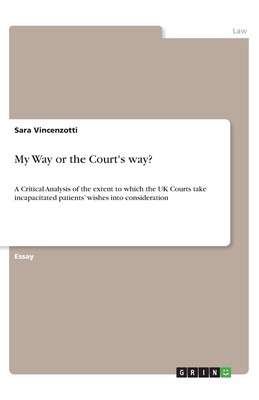
- We will send in 10–14 business days.
- Author: Sara Vincenzotti
- Publisher: GRIN Verlag
- ISBN-10: 3346206130
- ISBN-13: 9783346206138
- Format: 14 x 21.6 x 0.1 cm, softcover
- Language: English
- SAVE -10% with code: EXTRA
Reviews
Description
Essay from the year 2020 in the subject Law - Miscellaneous, grade: 68.00, University of Manchester, course: LLM Healthcare Ethics and the Law, language: English, abstract: A patients' role was historically recognised as being considerably limited, arguably nonexistent, in determining what was considered to be their best interests. This essay will engage in a critical analysis of judge-made law relating to the extent of incapacitated patient participation in the assessment of their best interests. In an effort to do so, it will start by assessing the noteworthy judgements which have developed the extent in which an incapacitated patient's wishes, feelings and views may be taken into account. This evaluation will prove the dynamic shift in societal opinion and medical practice, which developed a paternalistic 'doctor knows best approach' of bests interests to a patient centered one instead. Following this, I will engage in a critical case analysis of Peter Jackson J's antagonistic judgements in A Local Authority v E and the later decision of Wye Valley. This comparison will be used to show how the extent to which the courts have taken into account an incapacitated patient's wishes has conclusively expanded over time. Finally, I will conclude by analysing what the relevant advantages and disadvantages are of incorporating a patient's wishes into the best interests test assessment.
EXTRA 10 % discount with code: EXTRA
The promotion ends in 20d.16:22:56
The discount code is valid when purchasing from 10 €. Discounts do not stack.
- Author: Sara Vincenzotti
- Publisher: GRIN Verlag
- ISBN-10: 3346206130
- ISBN-13: 9783346206138
- Format: 14 x 21.6 x 0.1 cm, softcover
- Language: English English
Essay from the year 2020 in the subject Law - Miscellaneous, grade: 68.00, University of Manchester, course: LLM Healthcare Ethics and the Law, language: English, abstract: A patients' role was historically recognised as being considerably limited, arguably nonexistent, in determining what was considered to be their best interests. This essay will engage in a critical analysis of judge-made law relating to the extent of incapacitated patient participation in the assessment of their best interests. In an effort to do so, it will start by assessing the noteworthy judgements which have developed the extent in which an incapacitated patient's wishes, feelings and views may be taken into account. This evaluation will prove the dynamic shift in societal opinion and medical practice, which developed a paternalistic 'doctor knows best approach' of bests interests to a patient centered one instead. Following this, I will engage in a critical case analysis of Peter Jackson J's antagonistic judgements in A Local Authority v E and the later decision of Wye Valley. This comparison will be used to show how the extent to which the courts have taken into account an incapacitated patient's wishes has conclusively expanded over time. Finally, I will conclude by analysing what the relevant advantages and disadvantages are of incorporating a patient's wishes into the best interests test assessment.


Reviews